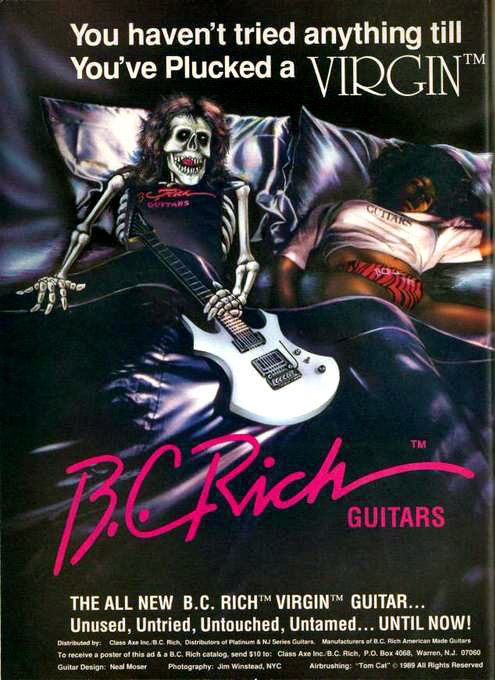
The 1980s in America was a time of unadulterated debauchery and decadence, and to expect anything less from the advertisements of the time would frankly be naive. Here we see an ad for BC Rich Guitars, promoting their new Virgin series of guitars. The ad depicts a heavy metal skeleton in bed with a skimpily-clad woman while holding the guitar, with the tagline reading, “You haven’t tried anything till you’ve plucked a Virgin.” A further description in the lower half of the ad reads, “The all new BC Rich Virgin Guitar… Unused, Untried, Untouched, Untamed… Until now!” The purpose of this ad is to draw comparisons between the Virgin guitar line and actual virgin girls, in that playing and plucking them is the truest form of pleasure there is. However, what may have started out as a novel yet camp idea in the think tank of BC Rich now manifests itself as a sexist and objectifying advert that demeans women and with the added benefit of hindsight, comes off as a microcosm of 80s misogyny.
What first stands out is the bright pink of the BC Rich Guitars logo in the advertisements, pink being a colour that’s often likened to femininity and sex, immediately letting the viewer know what this ad is all about. The neon pink is juxtaposed against a dark background, creating a grim and uneasy atmosphere, which is punctuated by the presence of a skeleton. However, the substance of this ad lies in the woman who appears to be either asleep or passed out next to the skeleton, presumably after sex, and the virgin comparisons that are drawn. What this ad does is that it objectifies women first by labelling them (virgins; nothing more) and by likening them to an actual object, a guitar. It also glorifies the deflowering of virgin women by describing the experience as incomparable, promoting an almost-rape culture in which the man gets to decide when to deflower the virgin, as opposed to consensual sex. This idea of male dominance is captured through the skeleton’s facial expression with his tongue sensually out, like he’s hungry for more, while the woman lies asleep/unconscious, submissive in her body language.
Carol Ann Duffy, former Poet Laureate of the United Kingdom, is someone who has tackled topics such as sexism, representation, and gender through her works, and her poem Salome is one that encapsulates several of the themes that flow through this advertisements, but with a twist. The title character of Salome is a murderous mistress who decapitates the men she sleeps with and demands for their heads to be served on platters. Duffy subverts common stereotypes (as perpetrated in this ad) through her characterization of Salome. As opposed to the man waking up next to a woman whose name he doesn’t know (objectified as a virgin), it is the woman who does so instead. As opposed to the man who wakes up “hungover and wrecked” (the man’s facial expression corroborates this), Salome does so instead. As opposed to the ‘virgin’ who “comes like a lamb to the slaughter,” the man does so instead, only to find his head served on a platter later. Through this poem, Duffy offers up an alternate reality of sorts in which men are submissive and women dominant, challenging stereotypes instigated by ads like these.
What must be considered is the context in which this ad was created, and the target audience of BC Rich. BC Rich is a guitar company whose heyday was during the excess of 1980s Los Angeles Hair Metal, and their audience would not have been one to find issue in sexist ads like these. For all the outcries of Tipper Gore, the voices of the thousands of youth aspiring to be the next Eddie Van Halen would support the guitar companies that give them a voice, no matter what the content of their ads. BC Rich was catering to their target audience, and they did so effectively. When we look back on it today, there’s absolutely no doubt that the ad was sexist and a product of its time, and we wouldn’t expect similar ads to be produced today. However, the sad reality is that they are. Sexism in advertising is still a major issue, and the problem is that we can’t hold anyone accountable for it, as exemplified by BC Rich. Companies have no legal obligation to represent everyone accurately and/or not be manipulative in their ads. It may not be the morally just thing to do, but if it works for a company financially, it’s hard to see such practices stopping in the future, like it or not.